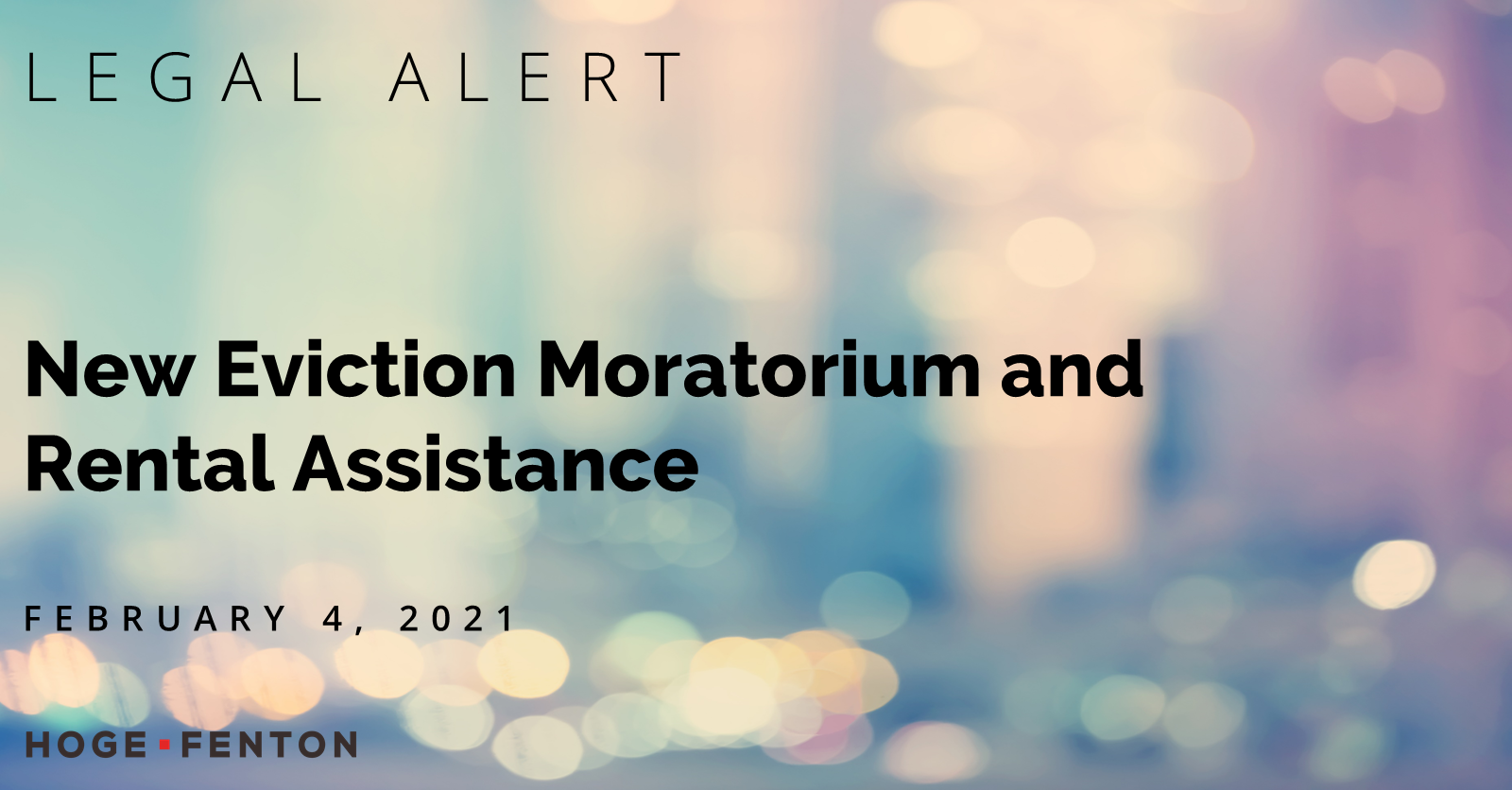New Eviction Moratorium and Rental Assistance
By Hoge Fenton | 02.4.2021 | Firm Post

Federal Funds Now Available for Back-Owed Rent; California’s Qualified Residential Eviction Moratorium Extended Again
Landlords MUST Notify Tenants of the New Law By February 28, 2021 to Preserve Landlords’ Right to Relief
by Giuliana Ferrante and Steven Kahn
COVID-19 is, tragically, far from over. In response, California recently extended its qualified statewide residential eviction moratorium to June 30, 2021. The new law, SB 91, replaces California’s COVID-19 Tenant Relief Act of 2020 (AB 3088 / “the Act”), signed by Governor Newsom on August 31, 2020, and adds several new features beneficial to both landlords and tenants.
AB 3088 originally protected residential tenants from eviction if those tenants declared under penalty of perjury that they suffered economic hardships related to COVID-19 and paid at least 25% of their total rent due by January 31, 2021. Covered tenant hardships include, but are not limited to: the loss of a job, or the need to care for a family member with severe COVID-19 symptoms.
SB 91 extends residential tenants’ protection from eviction from January 31, 2021 to June 30, 2021, after which landlords can either: (1) file unlawful detainer (eviction) lawsuits against tenants who do not pay the minimum 25% of total rent due; or (2) sue for monetary “civil debt” in small claims court for the amount of rent owed, even if that amount is higher than the usual small claims maximum.
SB 91 also provides instructions for allocating $1.4 billion in federal emergency rental assistance funds: soon, landlords providing housing to residential tenants have the option to apply for government funding covering up to 80% of rent accumulated during the specified period of April 1, 2020 and March 31, 2021, for tenants who demonstrated they could not pay their rent due to the COVID-19 pandemic.
Eviction Moratorium – Qualified and Extended
In order to preserve their rights to seek damages and pursue unlawful detainer lawsuits against non-paying tenants after the expiration of the eviction moratorium on June 30, 2021, and their rights to apply for missed rent assistance, landlords must follow these procedures:
- No later than February 28, 2021: Provide tenants who missed rent payments between April 1, 2020 through February 1, 2021 with an informational notice of the extension of the Act and the establishment of the rental assistance program. An example of this notice prepared by the California Department of Real Estate is available at this link. Landlords who do not timely provide this notice cannot serve tenants with a 15-Day Notice to Pay Rent or Quit (described below).
- Each time a tenant fails to pay the rent due for a rental period (typically the first of the month), serve the tenant with:
- (1) a “Notice from the State of California” – An example of this notice prepared by the California Department of Real Estate is available at this link.
- (2) a blank “Declaration of COVID-19-Related Financial Distress” – An example of this notice prepared by the California Department of Real Estate is available at this link.
- (3) a “15-Day Notice to Pay Rent or Quit” – An example of this notice prepared by the California Department of Real Estate is available at this link.
- If the landlord has information on file that the tenant is a “high-income tenant” who makes over 130% of the median income in that county, they may request additional information proving the hardship. An example of this notice to be used in this circumstance prepared by the California Department of Real Estate is available at this link.
Residential tenants cannot be evicted by their landlords until July 1, 2021, only if those tenants adhere to the following procedures:
- Use the declaration form provided by the landlord to declare under penalty of perjury that the tenant has a covered hardship caused by the COVID-19 pandemic;
- Return that sworn declaration to the landlord within 15 days of receiving a “Notice to Pay Rent or Quit” and the applicable “Notice from the State of California” served by the landlord;
- Pay at least 25% of their total rent due between September 1, 2020 and June 30, 2021, no later than June 30, 2021.
Rental Assistance
SB 91 allows landlords to apply to the State of California for reimbursement of up to 80% of past due rent owed by tenants from April 1, 2020 through March 31, 2021, payment of which will come from federal funds. Landlords who receive these State Rental Assistance funds must agree to forgive the tenant’s remaining debt from the April 1, 2020 through March 31, 2021 period and forego any claim for unlawful detainer arising out of unpaid rent from that period. In other words, Landlords will be paid 80% of unpaid rent accrued from April 1, 2020 through March 31, 2021 in exchange for not evicting tenants for unpaid rent during that period.
If a landlord does not participate in the State Rental Assistance Program, the tenant can apply to the State of California for assistance covering up to 25% of their unpaid rent from April 1, 2020 through March 31, 2021. More federal funding may become available to assist with future rental payments.
SB 91 requires the State Rental Assistance Program to accept applications no later than March 15, 2021. Plan administrators have not released details on the application process or instructions to apply. Localities with over 200,000 residents will receive the emergency funding directly, and those local governments will oversee the application process. Organizations including the California Apartment Association anticipate that the application will include information such as the tenant’s proof of income and proof of hardship.
Local Law
Under both the Act and SB 91, landlords can still evict tenants for certain “just cause” reasons – i.e. other than nonpayment of rent – including for issues of health and safety, or if the landlord elects to remove a unit from the rental market. However, landlords should take caution that local eviction moratoriums may offer stronger protections than the State law. For example, several Bay Area cities, including Berkeley, Oakland, and San Francisco, enacted stronger tenant protection laws in response to COVID-19.
While the Act and SB 91 prevent localities from extending or changing their moratoriums, any local moratorium in place on or before August 19, 2020 will remain in effect through the date the local law itself set out for its expiration.
More information about the COVID-19 Tenant Relief Act, SB 91, and the rental assistance programs, including more information about how to qualify for assistance, can be found at the California Department of Real Estate’s website or by calling 1-833-422-4255. The California Department of Real Estate’s tenant forms can found here and landlord forms can be found here.
Have a dispute with a residential or commercial landlord/tenant?
Contact our Real Estate and Land Use Group here.
Our Real Estate and Land Use Attorneys
 |
Giuliana Ferrante is an accomplished litigator in the firm’s Real Estate and Land Use Group. Giuliana represents clients through all stages of litigation from case evaluations to appeals. Her practice focuses on handling intricate appellate matters, business litigation, insurance coverage, insurance bad faith claims, and other commercial disputes. |
 |
Steven Kahn is a Shareholder and Chair of the Real Estate and Land Use Group who balances litigation skill with a strategy to achieve his clients’ goals and protect their interests. He focuses on real estate disputes and litigation. Steven represents clients throughout Northern California, including individuals, families, trusts, real estate professionals, insurers, municipalities, and businesses of any size, private or public. |
This information is provided as an educational service by Hoge Fenton for clients and friends of the firm. This communique is an overview only, and should not be construed as legal advice or advice to take any specific action. Please be sure to consult a knowledgeable professional with assistance with your particular legal issue. © 2021 Hoge Fenton










